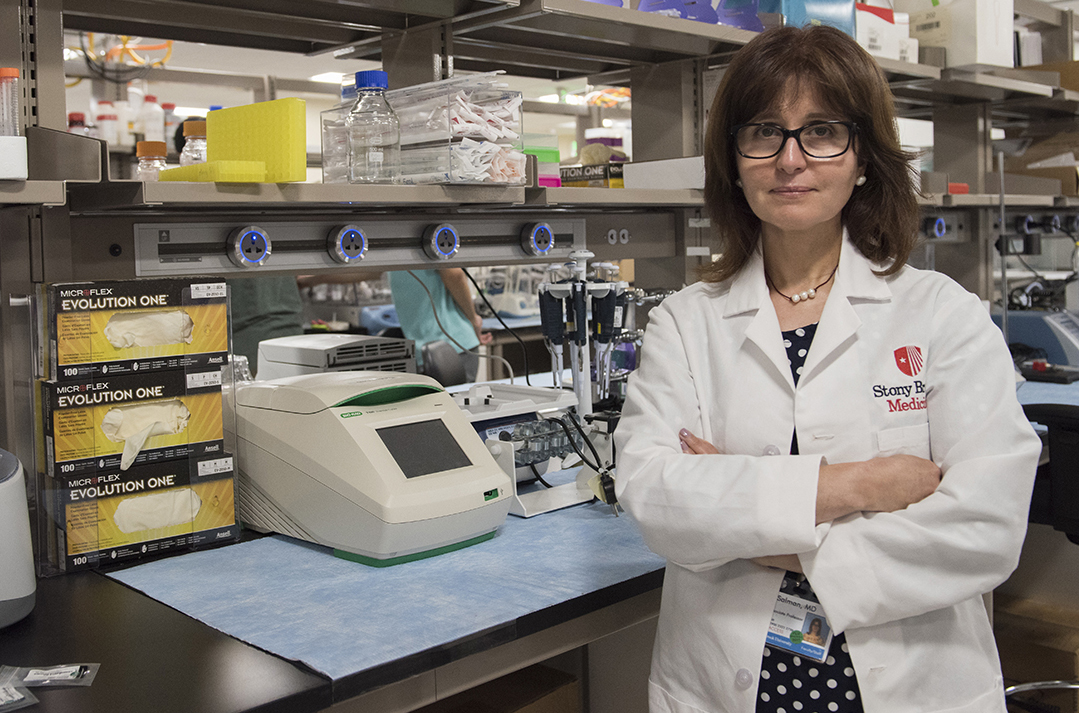
Advances in cancer treatment mean there are more cancer survivors today than ever before. But challenges remain. Cancer cells are clever. Some learn how to evade the patient’s immune system and administered treatments, only to compromise the human body and ultimately become resistant to every approach.
Blood cancers, such as leukemia or lymphoma, are complex cancers to treat. There are many subtypes of blood cancers, and each requires its own specific treatment approach.
At Stony Brook Cancer Center, specialists will be using a treatment called CAR T-cell therapy to treat certain blood cancers. The first clinical therapy to be initiated at the Cancer Center using CAR T cells will target T-cell cancers that don’t respond to standard therapies. This pivotal trial was developed in close collaboration with iCell Gene Therapeutics.
“CAR T-cell therapy is a type of cellular immunotherapy that enhances the patient’s own immune system to fight cancer by genetically modifying a patient’s own T cells,” said Huda Salman, MD, Director, Hematologic Malignancies Section, and Director, CAR T Cellular Therapy Program.
T cells, a type of white blood cells, play a major role in fighting cancers. CAR stands for chimeric antigen receptors, and they are proteins that are added to a person’s T cells to allow them to specifically target and kill the cancer cells.
How CAR T-cell therapy works
“During CAR T-cell therapy, we harvest a patient’s own T cells and genetically modify them in the laboratory,” said Dr. Salman. “We then introduce the CAR transgene into the T cells. This results in more potent and more cancer-specific T cells.” and kill the cancer cells.
From there, the next steps are:
• The modified CAR T cells are grown in the lab until there is an adequate amount.
• The modified cells are then given back to the patient via intravenous (IV) infusion.
• The modified T cells learn how to recognize a specific target, or antigen, that is found on the patient’s cancer cells.
• T cells continue to multiply in the patient’s body as they work to recognize and kill cancer cells.
Because the cells stay in a person’s body and continue to seek and destroy new cancer cells that may try to take hold, the benefits of CAR T-cell therapy can last for many years and are often referred to as “live therapy.”
The benefits of CAR T-cell therapy at Stony Brook Cancer Center
Stony Brook’s CAR T-cell therapy program is unique because the team will be the first to use CAR T cells directed against the target protein CD4 (CD4 CAR). “We received Food and Drug Administration (FDA) clearance for an Investigational New Drug (IND) for the treatment of patients with T-cell acute lymphoblastic leukemia and T-cell lymphoma. Both are difficult-to-cure cancers,” said Yusuf A. Hannun, MD, Director, Stony Brook Cancer Center. “We are excited to be able to offer this first-in-human therapy to our patients.”
Long Islanders who qualify for the trial will be able to access Stony Brook’s innovative program close to home where the Cancer Center’s team can collaborate with other Stony Brook Medicine doctors in a multidisciplinary approach across the entire spectrum of care. This allows Stony Brook physicians to take care of other coexisting conditions, any new unexpected illnesses, as well as treatment complications — all in the same location.
Stony Brook Cancer Center scientists are working on developing several other CARs directed toward other major blood cancers, such as myeloid leukemia and multiple myeloma. “My team and I are thrilled to be part of Stony Brook Cancer Center,” Dr. Salman said, “where we can work together to improve cancer care for Long Islanders.”
For information about the CAR T cell therapy clinical trial program, call (631) SB-TRIAL (728-7425).
For an appointment at Stony Brook Cancer Center, call (631) SB-CANCER (722-2623).

